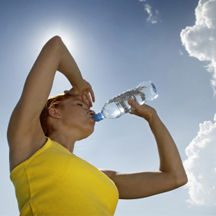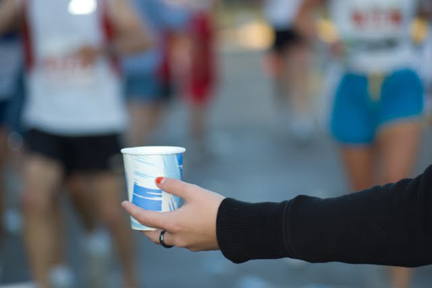Total Therapy Blog
Gearing Up for the Run… Hydration for Runners
 Welcome to our eighth part of “Gearing Up for the Run”. Last article, we talked about the mouth watering topic of Carb Loading. This week, we discuss the importance of staying hydrated while performing physical activity. If you missed our previous parts, you can find them here: Part 1, Part 2, Part 3, Part 4, Part 5, Part 6, Part 7.
Welcome to our eighth part of “Gearing Up for the Run”. Last article, we talked about the mouth watering topic of Carb Loading. This week, we discuss the importance of staying hydrated while performing physical activity. If you missed our previous parts, you can find them here: Part 1, Part 2, Part 3, Part 4, Part 5, Part 6, Part 7.
The importance of staying hydrated has been the subject of numerous studies and many sports-related conversations. We’re all familiar with the conventional thought that you should drink 8 – 10 glasses of water a day. But current research suggests that this popular rule-of-thumb doesn’t give you an accurate picture of your hydration needs. This is particularly important for runners – improper hydration can decrease your performance, and in extreme situations, result in hospitalization. So what constitutes “good” hydration? In order to answer that question, we need to understand how our bodies respond to exercise.
Sweating is a natural response to exercise. It’s our body’s mechanism of thermoregulation (how we cool down). Sweating keeps you cool and safe while you’re out running. Why does this matter? As you run, your muscles require energy. Your muscles use a chemical form of energy (ATP) to get a muscle to contract. However, our bodies are not efficient at using ATP. In the process of converting our chemical energy (ATP) to mechanical energy (running), our bodies create heat.
 To cool ourselves down, our body sweats, and the evaporating sweat on our skin cools our body. As we sweat we lose different types of ions from our blood stream known more commonly as electrolytes. How much electrolytic and nutrient content we lose is dependent on how much we sweat, but keep in mind sweat is primarily water. This is why it’s important to keep yourself hydrated at all times.
To cool ourselves down, our body sweats, and the evaporating sweat on our skin cools our body. As we sweat we lose different types of ions from our blood stream known more commonly as electrolytes. How much electrolytic and nutrient content we lose is dependent on how much we sweat, but keep in mind sweat is primarily water. This is why it’s important to keep yourself hydrated at all times.
No matter the run duration, water should be consumed on a regular basis. Water consumption will vary on a per-person basis, but here are some general guidelines you can follow….
500-600 ml 2-3 hours before running
200-300 ml 15 minutes before running
150-250 ml every 15 minutes during a run. Sipping water throughout a run is a good habit to get into as opposed to taking large gulps when you’re extremely thirsty.
Weigh yourself before and immediately after a practice run. You should drink 500 ml of water for every pound lost during exercise
Keep in mind, hydration is not a one-shot deal. Prior to race and during your training, ensure that you’re meeting your body’s water needs. Waiting until you become thirsty before drinking water means that you’ve waited too long.

The night prior to race, ensure that you are hydrating properly. Most runs start early in the morning – you may not have 2 -3 hours prior to race start to hydrate. Therefore, it’s important to hydrate the night prior. During the run, take advantage of the water stations along the race route to rehydrate yourself. Most runs, including the Sun Run have multiple stations available. Alternatively, some people prefer to run with a water bottle on them. There are plenty of options for carrying cases for runners that enable you to do this easily. Check out your local sports store for ideas.
Remember – running a successful race is all about preparation, and that preparation extends beyond simply running more often. By incorporating smart hydration practices into your training and actual race, you’ll increase both your performance, and your enjoyment of race day. Happy trails!
What do you do to stay hydrated? What experiences have you had with hydration and running?
Previous Parts: Part 1, Part 2, Part 3, Part 4, Part 5, Part 6, Part 7.








Follow Us!
& Stay Up To Date
BLOG